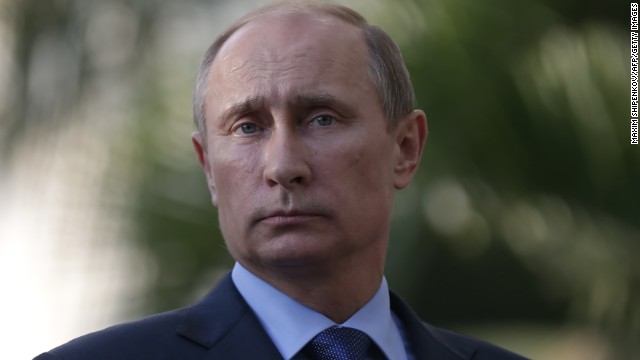 Russia's President Vladimir Putin is a popular but polarizing figure who has dominated Russian politics for more than a decade. Click through to see some highlights of his career.
Russia's President Vladimir Putin is a popular but polarizing figure who has dominated Russian politics for more than a decade. Click through to see some highlights of his career. 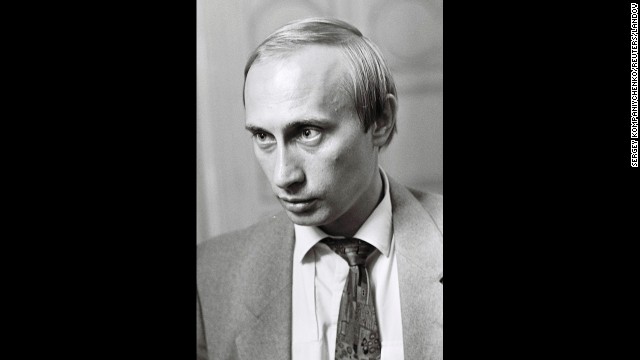 Putin serves as the chairman of the Foreign Relations Committee of the City Council in St. Petersburg from 1991 to 1994. Before becoming involved in politics, he served in the KGB, a Soviet-era spy agency, as an intelligence officer.
Putin serves as the chairman of the Foreign Relations Committee of the City Council in St. Petersburg from 1991 to 1994. Before becoming involved in politics, he served in the KGB, a Soviet-era spy agency, as an intelligence officer.  Russian President Boris Yeltsin, right, shakes hands with Putin during a farewell ceremony at the Kremlin in Moscow on December 31, 1999. Putin rose quickly through the political ranks, becoming the second democratically elected president of the Russian Federation in 2000.
Russian President Boris Yeltsin, right, shakes hands with Putin during a farewell ceremony at the Kremlin in Moscow on December 31, 1999. Putin rose quickly through the political ranks, becoming the second democratically elected president of the Russian Federation in 2000. 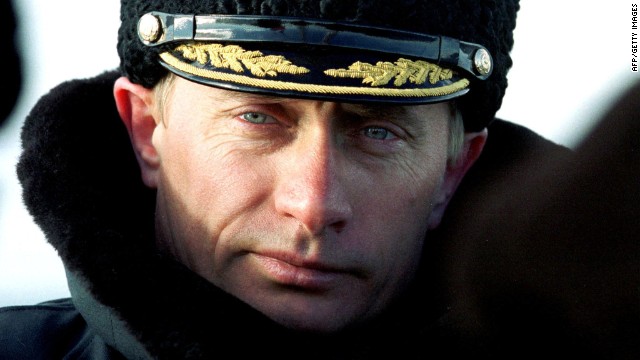 President-elect Putin watches the tactical exercises of Russia's Northern Fleet in the Barentsevo Sea on April 6, 2000. He has been at the helm during a decade of Russian economic growth fueled by natural resources of gas and oil.
President-elect Putin watches the tactical exercises of Russia's Northern Fleet in the Barentsevo Sea on April 6, 2000. He has been at the helm during a decade of Russian economic growth fueled by natural resources of gas and oil.  A Russian cadet snaps a picture with Putin in Moscow's Red Square on May 9, 2007, during an annual celebration of the end of World War II. Putin has pushed to modernize Russia's military.
A Russian cadet snaps a picture with Putin in Moscow's Red Square on May 9, 2007, during an annual celebration of the end of World War II. Putin has pushed to modernize Russia's military. 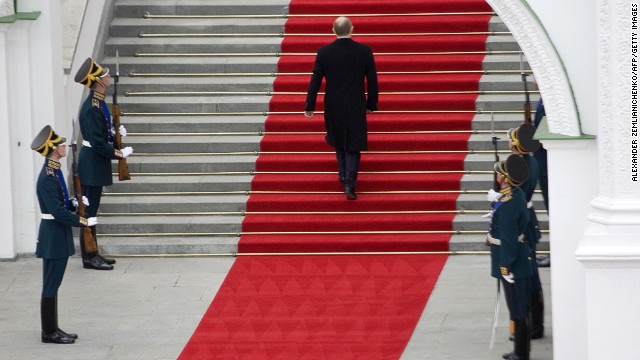 Putin attends an inauguration ceremony for president-elect Dmitry Medvedev at Moscow's Kremlin on May 7, 2008. Putin was constitutionally obliged to stand down as president but stayed close to power, becoming prime minister.
Putin attends an inauguration ceremony for president-elect Dmitry Medvedev at Moscow's Kremlin on May 7, 2008. Putin was constitutionally obliged to stand down as president but stayed close to power, becoming prime minister. 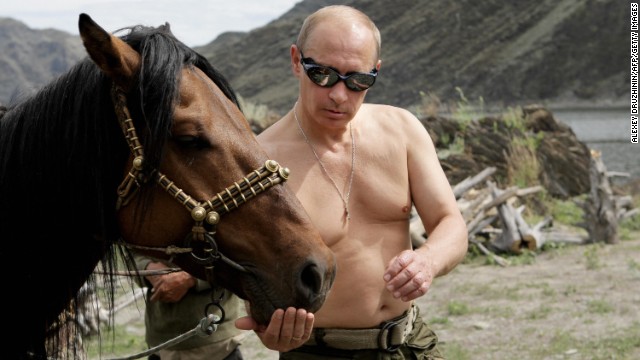 Putin vacations outside the town of Kyzyl in Southern Siberia in 2009. Over the years he has earned a reputation as a "strongman," declaring a crackdown on Chechen militants a priority in his first presidential term.
Putin vacations outside the town of Kyzyl in Southern Siberia in 2009. Over the years he has earned a reputation as a "strongman," declaring a crackdown on Chechen militants a priority in his first presidential term. 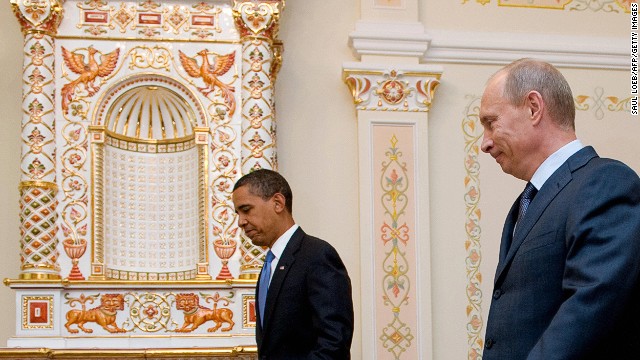 President Barack Obama meets Prime Minister Putin at his home in Novo Ogaryovo, near Moscow, on July 7, 2009. Putin said Russia was pinning its hopes on Obama to revive ties with the United States.
President Barack Obama meets Prime Minister Putin at his home in Novo Ogaryovo, near Moscow, on July 7, 2009. Putin said Russia was pinning its hopes on Obama to revive ties with the United States. 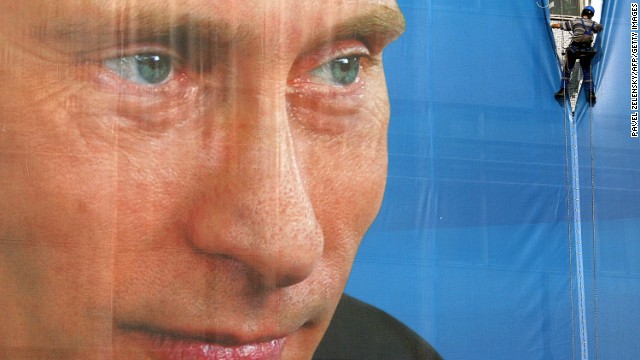 A worker takes down a giant elections poster bearing a portrait of Putin on October 13, 2009, in Moscow. Putin's party tightened its grip on Russian politics with a sweeping victory in local elections, officials said, as the opposition alleged widespread fraud.
A worker takes down a giant elections poster bearing a portrait of Putin on October 13, 2009, in Moscow. Putin's party tightened its grip on Russian politics with a sweeping victory in local elections, officials said, as the opposition alleged widespread fraud. 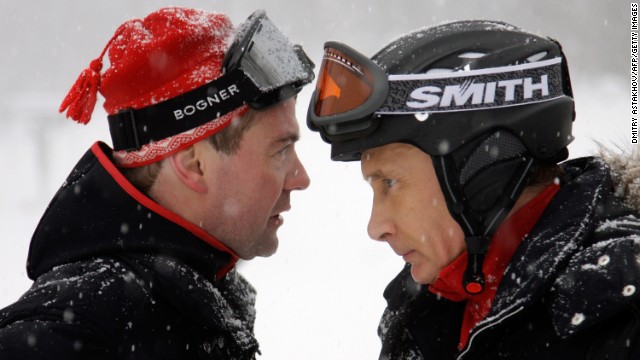 Russian President Medvedev and Prime Minister Putin ski together in Krasnaya Polyana, near the Black Sea resort of Sochi in southern Russia, on January 3, 2010.
Russian President Medvedev and Prime Minister Putin ski together in Krasnaya Polyana, near the Black Sea resort of Sochi in southern Russia, on January 3, 2010. 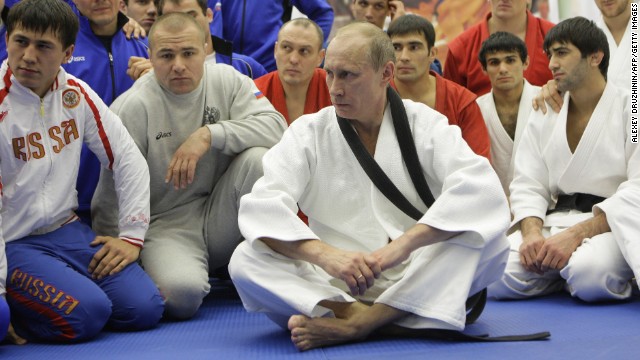 Putin takes part in a judo training session at a sports complex in St. Petersburg, on December 22, 2010. The Russian leader holds a black belt in judo.
Putin takes part in a judo training session at a sports complex in St. Petersburg, on December 22, 2010. The Russian leader holds a black belt in judo. 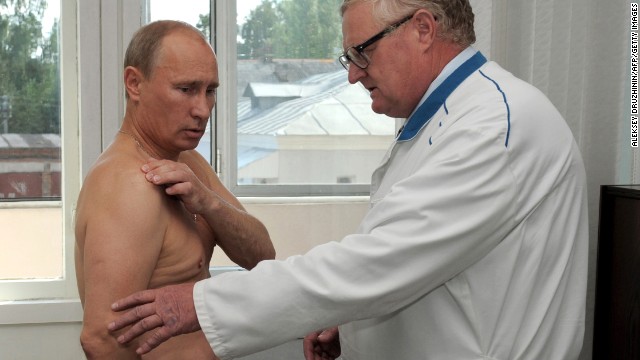 Putin receives a medical consultation during his visit to the Smolensk Regional Hospital on August 25, 2011. Putin said he hurt his shoulder during morning judo practice.
Putin receives a medical consultation during his visit to the Smolensk Regional Hospital on August 25, 2011. Putin said he hurt his shoulder during morning judo practice. 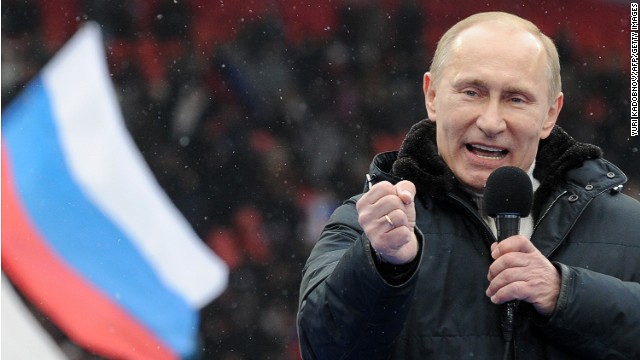 Putin speaks to supporters at a Moscow rally on February 23, 2012. He won the presidential election in March, with just under 65% of the vote. Former President Medvedev became his prime minister.
Putin speaks to supporters at a Moscow rally on February 23, 2012. He won the presidential election in March, with just under 65% of the vote. Former President Medvedev became his prime minister. 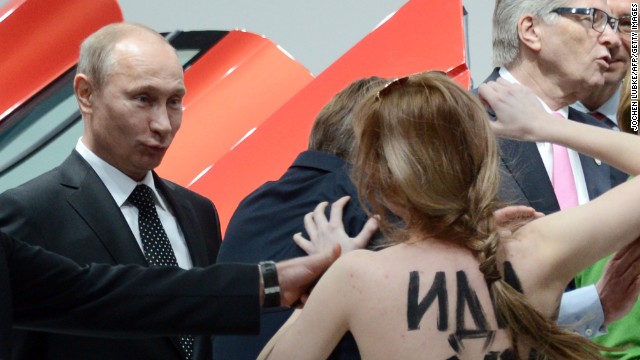 A topless protester shouts at Putin and German Chancellor Angela Merkel, center, during their visit to the Hanover Industrial Fair in central Germany on April 8. Human rights groups say civil liberties and democratic freedoms have suffered during Putin's rule.
A topless protester shouts at Putin and German Chancellor Angela Merkel, center, during their visit to the Hanover Industrial Fair in central Germany on April 8. Human rights groups say civil liberties and democratic freedoms have suffered during Putin's rule. 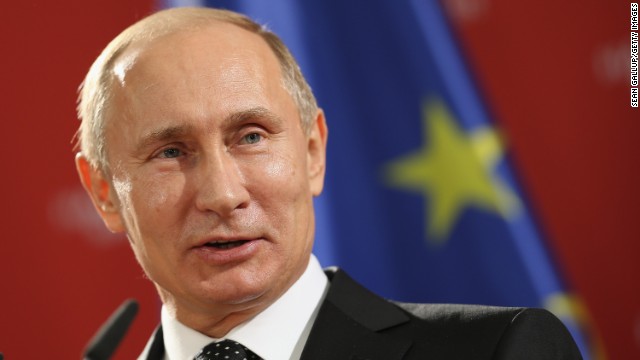 Putin addresses the media during his visit to Hanover on April 8.
Putin addresses the media during his visit to Hanover on April 8. 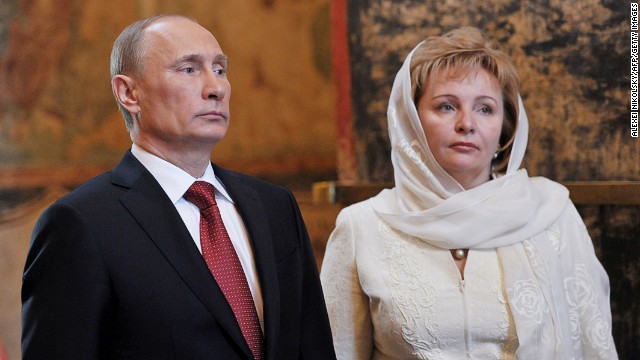 Putin and his wife, Lyudmila, ended their nearly 30-year marriage, the state-run news agency reported on June 6.
Putin and his wife, Lyudmila, ended their nearly 30-year marriage, the state-run news agency reported on June 6.  Putin, center, poses for a photo with Russian Olympic athletes in Sochi, Russia, on February 24. Russia hosted the Olympic Games and won the most medals.
Putin, center, poses for a photo with Russian Olympic athletes in Sochi, Russia, on February 24. Russia hosted the Olympic Games and won the most medals. 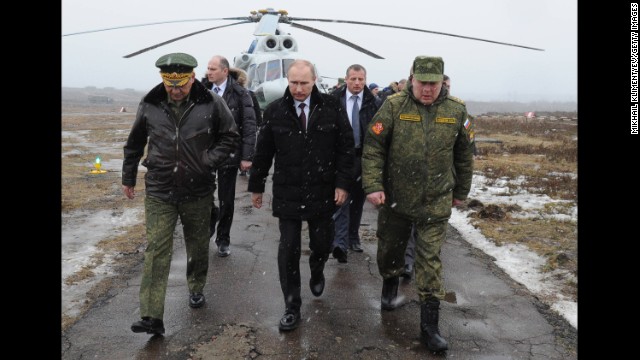 Putin, center, and Defense Minister Sergei Shoigu, left, arrive to watch a military exercise at the Kirillovsky firing ground in Russia's Leningrad region on March 3.
Putin, center, and Defense Minister Sergei Shoigu, left, arrive to watch a military exercise at the Kirillovsky firing ground in Russia's Leningrad region on March 3.
- Aaron Miller says even those with little knowledge of Ukraine should spot the myths we've heard
- He says Obama's foreign policy isn't to blame for what Putin did in Crimea
- Miller says this doesn't represent a new Cold War, nor is Putin equivalent to Hitler
- He says the outcome may be acceptable eventually but don't expect a Hollywood ending
Editor's note: Aaron David Miller is a vice president and distinguished scholar at the Woodrow Wilson International Center for Scholars and was a Middle East negotiator in Democratic and Republican administrations. Follow him on Twitter.
(CNN) -- Ignorance really isn't bliss. But there are times when the lack of knowledge and expertise about a subject or place can actually serve to clear the mind and lead to some clarity and honesty in the debate on even the most complex matters.
I'm certainly no expert on Ukraine. I'm not sure before this crisis that I could even name all of the countries that share its borders. But watching the ticktock of the debate on the issue this past week, I'm stunned by the lack of perspective and breathlessness in the discussion.
Sadly, I've grown accustomed to the partisanship. It has become a permanent fixture of our analytical and policy landscape. But here are several things about the recent coverage and discussion on Ukraine that even my lack of expertise won't allow me to accept:
1. We're back in the Cold War
Clearly, none of the resets have worked with Russian President Vladimir Putin. Whether it was President George W. Bush looking into his eyes and seeing his soul or Bob Gates finding a stone-cold killer there, Putin isn't Stalin, Khrushchev or Brezhnev. That's hardly a shocker. Nor are we still in that unique period when two superpowers with contrasting ideological systems under the threat of nuclear war clashed and fought by proxy from one end of the globe to the other.
There's no doubt that the United States and Russia have major differences. But the issue is no longer ideological. Russian capitalism is here to stay, state-controlled and monitored though it may be. And what ideology exists has more to do with asserting Russian national interests than anything Marx or Lenin would have recognized. And in at least one respect, that's too bad. At least during much of the Cold War, from the 1970s on, there were rules, do's and don'ts that prevented situations like Ukraine.
We'll continue to struggle with Putin, to be sure. But the world's too small, the Europeans too dependent on Russia, and the realities of global interdependence too deep to imagine hitting the rewind button and turning the planet into an arena of conflict and competition. Would it make for a good video game? Yes.
2. Putin is Hitler
 Sen. Marco Rubio: Putin blatantly lied
Sen. Marco Rubio: Putin blatantly lied 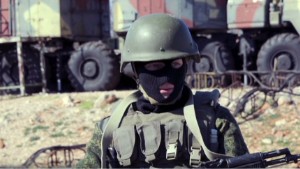 Turmoil continues in Ukraine
Turmoil continues in Ukraine  OSCE monitors denied entry into Crimea
OSCE monitors denied entry into Crimea In the past week, I've heard people I admire and respect talk about Crimea as Munich and Putin as Hitler. Twain wrote that history doesn't repeat; it rhymes. But those rhythmic patterns aren't evident here, either.
When we can't think of intelligent parallels in analyzing nations who do things America cannot abide, it seems we're drawn irresistibly to the Hitler trope. The same thing happens with Iran. And while I don't for a moment condone the vicious Israel-baiting and hating of the mullahcracy in Tehran (and the anti-Semitism, too) to bring up Hitler not only trivializes the monstrosity of the evil and the magnitude of the crimes in his time, it imposes unrealistic challenges in ours.
The unique challenge of Hitler demanded that he be stopped and the Nazi regime destroyed.
We don't have to like the Putin government in Russia, or Supreme Leader Ali Khamenei's in Iran, to recognize that the magnitude of the threat is different. To compare them to Hitler is to urge the United States into a game that we don't want to play and can't win.
As best I can figure, Putin is a clever and easily riled Russian nationalist who presides over what remains of an empire whose time has come and gone. He lives in reality, not in some megalomaniacal world. But he is prepared to assert Russia's interests in spheres where it matters, and to block the West's intrusion into those areas as best he can. Russia is his "ideology." And on Ukraine, history and proximity give him cards to play.
This man isn't a fanatic. Money, pleasure and power are too important to him. Any leader who is willing to be photographed shirtless on a horse, like some cover of Men's Health magazine, isn't going to shoot himself in the head or take cyanide in a bunker. This guy is way too hip (Russian style) and attached to the good life to be Hitler. And given Russia's own suffering at the hands of the Nazis, saying he is just makes matters worse.
3. It's all Obama's fault
President Barack Obama was never the catastrophic incompetent or Satan's finger on earth that his worst critics imagined nor the redeemer, savior, or great President that his most avid acolytes wanted. And yet the notion that Obama, through weak and feckless foreign policy, was responsible for Putin's move into Ukraine strains credulity to the breaking point.
This urban legend that because of Benghazi and the "red line" affair in Syria, Putin was compelled to do something in Ukraine that he wouldn't have done had Obama acted differently, is absurd. The administration's foreign policy has often resembled a blend between a Marx Brothers movie and the Three Stooges. But on this one the charge is absurd, as is the notion that somehow Obama could have stopped him.
When the Soviet Union invaded Hungary in 1956, there was no U.S. military response; ditto in 1968 when the Soviets put down Prague Spring in Czechoslovakia. Sometimes, geography really is destiny. Russia believed its vital interests in Ukraine were threatened and it had the means, will, and proximity to act on them. And it's about time we faced up to it.
4. Bombing Syria would have saved Ukraine
This notion that Obama's opponents have latched onto is, of course, unknowable. There are no rewind buttons in history. Counterfactuals are prime talking and debating points because they cannot be proven one way or the other. But to argue that launching cruise missiles at Syrian military targets somehow would have deterred Putin from acting on what he perceived to be a Russian vital interest, or emboldened the Europeans to stand tougher against him, really is off base.
Syria and Ukraine are like apples and oranges the President's detractors insist on putting in the same basket. Even if Obama thought the U.S. had vital interests that justified an attack on Syria, it is likely it would not have altered Putin's policy toward Ukraine. The country perceived to be in Russia's zone of influence and manipulation was drifting westward. And Putin was determined to stop it.
5. Ukraine can have a 'Hollywood' ending
Are there good guys and bad guys in the Ukraine-Russian drama? Sure there are. We have courageous Ukrainian patriots who died in the Maidan for the dignity and freedom they believed in; corrupt and ruthless government officials who were willing to use force against their own citizens; Russian provocateurs eager to stir up trouble; extremist Ukrainian nationalists who are hardly democrats; and a Russian strongman who hosted the Olympics one week and invaded the territory of a sovereign country the next.
I suspect that the Ukrainian Spring -- if that's what it is -- may turn out better than its Arab counterpart. But we have to be real. Ukraine may be fractious and troubled for some time to come.
Below the morality play there is intense factionalism; regional differences; scores to settle; Russian manipulation; and a tendency to avoid the kind of compromise that would lead to real power sharing and good governance.
We like Hollywood endings. But real democratization depends less on a friendly U.S. or EU hand than on the emergence of genuine leaders who are prepared to rise above factional affinities and see a vision for the country as a whole. It also depends on institutions that reflect popular will and some mechanism for accommodating differences peacefully without resorting to violence.
There are no easy or happy endings here. And we can only make matters worse, as Henry Kissinger suggested recently, by trying to turn the Ukraine crisis into a Russia vs. the West (or worse, the U.S.) tug-of-war.
Follow us on Twitter @CNNOpinion.
Join us on Facebook/CNN Opinion.
The opinions expressed in this commentary are solely those of Aaron David Miller.